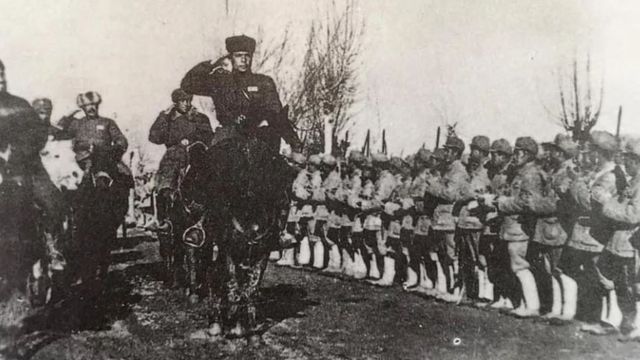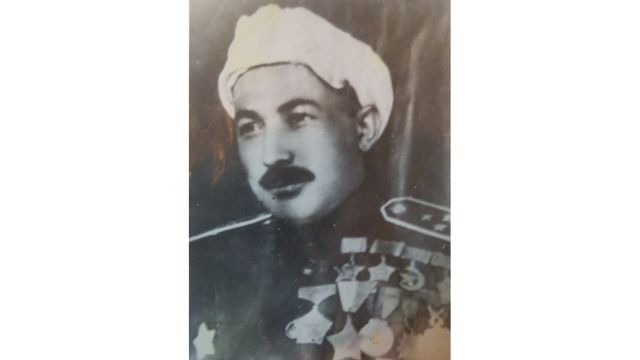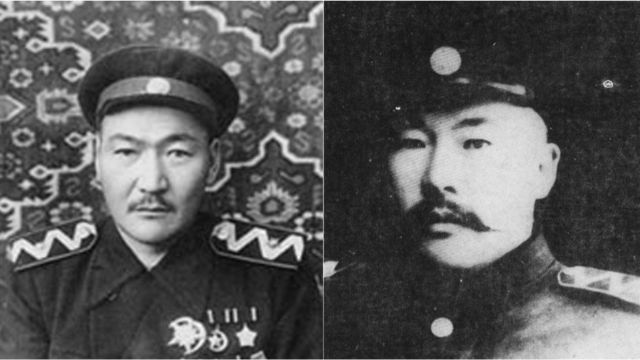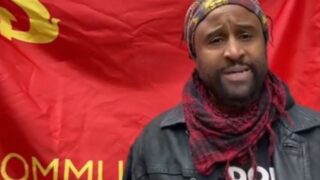In August 2023, Prigozhin’s plane crashed—or was crashed by Putin. In August 1949, the plane carrying the leaders of independent East Turkestan crashed—or was crashed by Stalin.
by Kok Bayraq


The plane crash that took place in Tver, Russia on August 23, 2023, and caused the death of Wagner chief Yevgeny Prigozhin, reminded the Uyghurs of their national grief of 74 years ago. A similar event took place on August 27, 1949 near the Russian city of Irkutsk, when Uyghur leaders were flying from Almaty to Beijing.
Just as Putin’s decision to include Wagner in the national army was a cause for the recent struggle, Stalin’s decision to submit East Turkestan (ET) to the People’s Republic of China was at the origins of the 1949 plane crash.
According to “Uyghur General History” (2022), by Uyghur historian Nabijan Tursun, who lives in the USA, in June 1949, Liu Shaoqi, one of the leaders of the Chinese Communist Party (CCP), met with Stalin during a visit to Moscow. In their conversation, Stalin promised Chairman Mao that he would put an end to the ET independent Republic and persuade Uyghur leaders to attend the founding ceremony of the People’s Republic of China.
As a result of that promise, on August 15, 1949, CCP delegate Deng Lichun arrived in Ghulja, the capital of the ET, to meet with Uyghur leaders. However, persuading the Uyghur leaders to set out for Beijing was not easy. They refused to join the People’s Republic of China and insisted on independence, expressing their intention not to allow the Chinese Red Army to enter ET. The Soviet Council, which was leading the negotiations, forced Uyghur leaders to accept becoming part of China unconditionally. Telegrams were flying between Ehmetjan Qasimi (the President of the ET Republic), Iosif Stalin, and Mao Zedong during the seven-day discussion. The Soviet side stated that the rapid and unhindered establishment of the People’s Republic of China was an urgent need for the international Communist movement.
On August 22, 1949, a group of delegates, including Ehmetjan Qasimi, set off from Ghulja for Almaty, the capital of Kazakhstan. The debate between the group and Soviet KGB leaders continued in Almaty. The Uyghur leaders presented their demands to become at least a Soviet-style federal republic associated with China. They reiterated that they could not give as a gift to the CCP the ET republic they had created by sacrificing the lives of thousands of Uyghurs.


On August 25, 1949, a group of delegates boarded a plane to Beijing, either by unknown agreement, compulsion, or hoping to achieve their aims there.
On September 2, 1949, Stalin informed Mao Zedong by telegram that the plane had an accident on August 27 in the vicinities of Irkutsk, near Lake Baikal, and all the delegation had perished. He informed Mao that “a second group [of Uyghur leaders] will arrive soon” in Beijing.
In the accident in Tver, all the top leaders of the Wagner were in the plane; in Irkutsk, the four top political and military leaders of the ET republic, President Ehmetjan Qasimi (35), Interior Minister Abdukerim Abbasov (27), Lieutenant General İshak Bey Munonov (47) and General Dalelkhan Sugirbayev (43) were among the nine delegates on board.


As Putin offered his condolences to Prigozhin’s family and friends and praised him as a “good man” following the accident, Mao also expressed his condolences to the Uyghur people, describing Ehmetjan Qasim as a “good comrade.”
Prigozhin’s death was announced to the whole world, but the death of Ehmetjan and his group was kept secret from the people of East Turkestan and their families for three months.
The second delegation, headed by Seypidin Azizi, safely traveled to Beijing and might have learned the lesson of the previous “accident.” On October 1, 1949, without the consent of the Uyghur people, they announced that they had agreed to join China.
As a result of the plane crash and the declaration of the second group of leaders, 30,000 soldiers and staff in the ET Republic were left without a commander. On October 12, 1949, the Chinese People’s Liberation Army entered ET without resistance. The region was peacefully “liberated.”
Through these plane incidents, just as Putin warned potential opponents by punishing Prigozhin, Stalin signaled to the leaders of Kazakhstan, Kyrgyzstan, Uzbekistan, and Turkmenistan what the consequences would be for insisting on independence and challenging him.
Thus far, Prigozhin’s death has not changed the course of the political situation in Russia or the world. However, the death of Ehmetjan Qasimi and his group led to the transfer of 1,664,897 km2 of Uyghur territory to Chinese occupation.


It is noteworthy that both cases have an indirect connection to NATO. According to Nabijan Tursun, the reason Stalin forced Uyghur leaders to join Beijing by giving up the independent ET he had supported for five years was the establishment of NATO in 1949. Stalin felt the need to build a strong alliance with a large territory against NATO. Putin also claims he invaded Ukraine to contain NATO.
We more or less know what happened to Prigozhin’s plane, although some doubt the official information is true and Russian authorities claim they are further investigating the incident themselves. In the Uyghur case, what exactly happened was never clarified and lost with the leaders who perished in the accident was their copy of the agreement between three parties (China, ET, and the Soviet Union)—the original draft about the future of the Uyghur people that the Uyghur leaders had carried on their journey to Beijing. The fact that two superpowers, the Soviet Union and China, kept their copies of the original documents secret reinforces the validity of the common Uyghur assumption about the accident—that Stalin had Uyghur leaders killed to assist Mao. When Ehmetjan Qasimi boarded the plane, the hint was given that there was no agreement between Ehmetjan himself, Mao, and Stalin.
Prigozhin was the brutal leader of a mercenary group, although he had supporters in Russia. Ehmetjan Qasimi and his group were highly educated intellectuals. They were heroes and geniuses who fought against the Chinese Army in part of their homeland and liberated their people.
Three days after his death, Putin accused Prigozhin of having made a “serious mistake,” and the accusation may explain why he had to die. China deleted Ehmetjan Qasimi’s name from Uyghur textbooks in 2017, 68 years after the accident, and the reason for the deletion was explained with the need of destroying examples of separatism.


While the Prigozhin incident is a hot topic today, the Ehmetjan Qasimi incident remains a political mystery of the 20th century. Ramifications of that mystery continue, with three million Uyghurs sent to camps and a genocide that is still being carried out meticulously.
These events in Russia and China remain unresolved. Even though the Soviet Union was destroyed, the imperialist mentality of the state did not disappear, and even though Stalin died, his heirs are still alive. Even though Mao Zedong is dead, his heirs, such as Xi Jinping, are standing tall.
I believe war will not stop until the world discovers these secrets and holds those responsible accountable. Even if the war stops, if the root of the problem is not solved, genocides will continue, and the world will continue to feel the corresponding pain.









